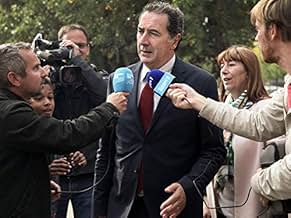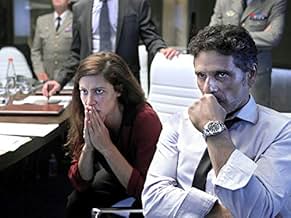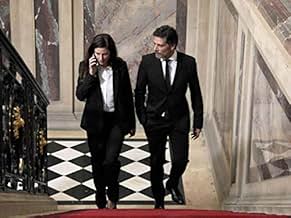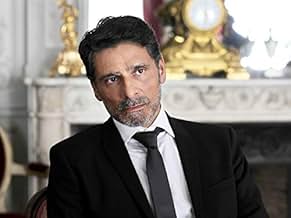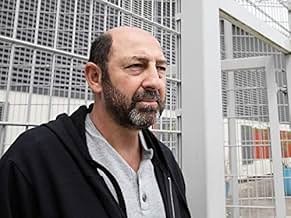ÉVALUATION IMDb
7,8/10
1,7 k
MA NOTE
L'histoire d'un président français en devenir et d'un ami à lui, le maire d'une petite ville du nord de la France.L'histoire d'un président français en devenir et d'un ami à lui, le maire d'une petite ville du nord de la France.L'histoire d'un président français en devenir et d'un ami à lui, le maire d'une petite ville du nord de la France.
- Prix
- 1 victoire et 16 nominations au total
Parcourir les épisodes
Histoire
Le saviez-vous
- AnecdotesCharacters smoke so much that at one point Canal Plus envisioned to name the série Black Lung
- ConnexionsFeatured in De quoi j'me mêle!: Episode #1.3 (2019)
Commentaire en vedette
I just watched all three seasons of this show over the course of a few weeks. I really enjoyed it, and now I'm yearning for a fourth season, although rumor suggests it won't be happening.
I found the characters very compelling, above all Kad Merad as Philippe Rickwaert, the master Machiavellian. After one episode I thought, "This guy reminds me James Gandolfini, which would make Rickwaert the Tony Soprano of French politics" -- and sure enough, by season 3 one of the characters was making the same comparison. (Rickwaert doesn't kill people, but his associates do have a habit of committing suicide.)
Almost as notable as Merad are Anna Magloulis as Amelie, Astrid Whetnall as Veronique, and Hugo Becker as Cyril Balsan, all of whom were new to me. I've watched other French shows (Village Francais, Engrenages, Dix Pour Cent, Parlement) but the only faces I recognized in BN were Philippe Resimont as Kalhenberg (he played a collabo in VF) and Scali Delpeyrat as Borde (an uber creepy aristocrat in Engrenages).
Several commenters have compared the show to Borgen, and I agree. But whereas Borgen seems positive and feel-good, Baron Noir delights in exposing the vanity, deceit, and ruthless venality of its political players.
I knew next to nothing about French politics before I watched this show, and my ignorance made it hard to follow certain episodes (especially given the subtitles, which can be misleading). But the series is so well-produced that I kept going. By season two I was consulting Wikipedia a lot. At least to this outsider, French politics seems far more complex and labyrinthine than politics in the US or UK -- e.g., the sheer profusion and volatility of the political parties. When I finished watching the whole thing, I read some formal reviews and realized that many of the characters were directly inspired by real people.
This show won't be everybody's cup of tea. It's most likely to appeal to political junkies and those with a taste for European TV. I fall into both categories. I also have a goal of improving my French, so I watched many scenes twice in quick succession, reading the subtitles the first time & ignoring them the second. That tactic really improved my comprehension, and made me appreciate the series' production values even more.
I found the characters very compelling, above all Kad Merad as Philippe Rickwaert, the master Machiavellian. After one episode I thought, "This guy reminds me James Gandolfini, which would make Rickwaert the Tony Soprano of French politics" -- and sure enough, by season 3 one of the characters was making the same comparison. (Rickwaert doesn't kill people, but his associates do have a habit of committing suicide.)
Almost as notable as Merad are Anna Magloulis as Amelie, Astrid Whetnall as Veronique, and Hugo Becker as Cyril Balsan, all of whom were new to me. I've watched other French shows (Village Francais, Engrenages, Dix Pour Cent, Parlement) but the only faces I recognized in BN were Philippe Resimont as Kalhenberg (he played a collabo in VF) and Scali Delpeyrat as Borde (an uber creepy aristocrat in Engrenages).
Several commenters have compared the show to Borgen, and I agree. But whereas Borgen seems positive and feel-good, Baron Noir delights in exposing the vanity, deceit, and ruthless venality of its political players.
I knew next to nothing about French politics before I watched this show, and my ignorance made it hard to follow certain episodes (especially given the subtitles, which can be misleading). But the series is so well-produced that I kept going. By season two I was consulting Wikipedia a lot. At least to this outsider, French politics seems far more complex and labyrinthine than politics in the US or UK -- e.g., the sheer profusion and volatility of the political parties. When I finished watching the whole thing, I read some formal reviews and realized that many of the characters were directly inspired by real people.
This show won't be everybody's cup of tea. It's most likely to appeal to political junkies and those with a taste for European TV. I fall into both categories. I also have a goal of improving my French, so I watched many scenes twice in quick succession, reading the subtitles the first time & ignoring them the second. That tactic really improved my comprehension, and made me appreciate the series' production values even more.
- symmachos
- 3 déc. 2021
- Lien permanent
Meilleurs choix
Connectez-vous pour évaluer et surveiller les recommandations personnalisées
- How many seasons does Baron noir have?Propulsé par Alexa
Détails
- Date de sortie
- Pays d’origine
- Site officiel
- Langue
- Aussi connu sous le nom de
- Baron Noir
- Consultez plus de crédits d'entreprise sur IMDbPro
Contribuer à cette page
Suggérer une modification ou ajouter du contenu manquant

Lacune principale
By what name was Baron noir (2016) officially released in India in English?
Répondre
